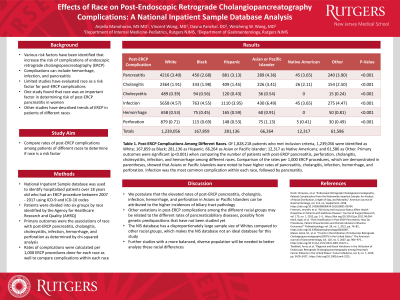Back


Poster Session C - Monday Afternoon
Category: Interventional Endoscopy
C0444 - Effects of Race on Post-ERCP Complications: A National Inpatient Sample Database Analysis
Monday, October 24, 2022
3:00 PM – 5:00 PM ET
Location: Crown Ballroom

Has Audio

Anjella Manoharan, MS, MD
Rutgers New Jersey Medical School
Newark, NJ
Presenting Author(s)
Anjella Manoharan, MS, MD, Vincent Wong, MD, Dayna Panchal, DO, Weizheng Wang, MD
Rutgers New Jersey Medical School, Newark, NJ
Introduction: Various risk factors have been identified that increase the risk of complications of endoscopic retrograde cholangiopancreatography (ERCP). Limited studies have evaluated race as a risk factor for post-ERCP complications. We aim to compare rates of post-ERCP complications among patients of different races to determine if it is a risk factor.
Methods: The National Inpatient Sample database was used to identify hospitalized patients over 18 years old who had an ERCP procedure between 2007 - 2017 using ICD-9 and ICD-10 codes. Patients were divided into six groups by race identified by the Agency for Healthcare Research and Quality (AHRQ). Primary outcomes were the associations of race with post-ERCP pancreatitis, cholangitis, cholecystitis, infection, hemorrhage, and perforation as determined by chi-squared analysis. Rates of complications were calculated per 1,000 ERCP procedures done for each race as well to compare complications within each race.
Results: Of 1,828,218 patients who met inclusion criteria, 1,239,056 were identified as White; 167,859 as Black; 281,136 as Hispanic; 66,264 as Asian or Pacific Islander; 12,317 as Native Americans; and 61,586 as Other. Primary outcomes were significant (p< 0.001) when comparing the number of patients with post-ERCP pancreatitis, perforation, cholangitis, cholecystitis, infection, and hemorrhage among different races. Comparison of the rates per 1,000 ERCP procedures showed that Asians or Pacific Islanders were noted to have higher rates of pancreatitis, cholangitis, infection, hemorrhage, and perforation. Infection was the most common complication within each race, followed by pancreatitis.
Discussion: We postulate that the elevated rates of post-ERCP pancreatitis, cholangitis, infection, hemorrhage, and perforation in Asians or Pacific Islanders can be attributed to the higher incidences of biliary tract pathology. Other variations in post-ERCP complications among the different racial groups may be related to the different rates of pancreaticobiliary diseases, possibly from genetic predispositions that have not been studied yet. Moreover, the NIS database has a disproportionately large sample size of Whites compared to other racial groups, which makes the NIS database not an ideal database for this study. Further studies with a more balanced, diverse population will be needed to better analyze these racial differences.
Disclosures:
Anjella Manoharan, MS, MD, Vincent Wong, MD, Dayna Panchal, DO, Weizheng Wang, MD. C0444 - Effects of Race on Post-ERCP Complications: A National Inpatient Sample Database Analysis, ACG 2022 Annual Scientific Meeting Abstracts. Charlotte, NC: American College of Gastroenterology.
Rutgers New Jersey Medical School, Newark, NJ
Introduction: Various risk factors have been identified that increase the risk of complications of endoscopic retrograde cholangiopancreatography (ERCP). Limited studies have evaluated race as a risk factor for post-ERCP complications. We aim to compare rates of post-ERCP complications among patients of different races to determine if it is a risk factor.
Methods: The National Inpatient Sample database was used to identify hospitalized patients over 18 years old who had an ERCP procedure between 2007 - 2017 using ICD-9 and ICD-10 codes. Patients were divided into six groups by race identified by the Agency for Healthcare Research and Quality (AHRQ). Primary outcomes were the associations of race with post-ERCP pancreatitis, cholangitis, cholecystitis, infection, hemorrhage, and perforation as determined by chi-squared analysis. Rates of complications were calculated per 1,000 ERCP procedures done for each race as well to compare complications within each race.
Results: Of 1,828,218 patients who met inclusion criteria, 1,239,056 were identified as White; 167,859 as Black; 281,136 as Hispanic; 66,264 as Asian or Pacific Islander; 12,317 as Native Americans; and 61,586 as Other. Primary outcomes were significant (p< 0.001) when comparing the number of patients with post-ERCP pancreatitis, perforation, cholangitis, cholecystitis, infection, and hemorrhage among different races. Comparison of the rates per 1,000 ERCP procedures showed that Asians or Pacific Islanders were noted to have higher rates of pancreatitis, cholangitis, infection, hemorrhage, and perforation. Infection was the most common complication within each race, followed by pancreatitis.
Discussion: We postulate that the elevated rates of post-ERCP pancreatitis, cholangitis, infection, hemorrhage, and perforation in Asians or Pacific Islanders can be attributed to the higher incidences of biliary tract pathology. Other variations in post-ERCP complications among the different racial groups may be related to the different rates of pancreaticobiliary diseases, possibly from genetic predispositions that have not been studied yet. Moreover, the NIS database has a disproportionately large sample size of Whites compared to other racial groups, which makes the NIS database not an ideal database for this study. Further studies with a more balanced, diverse population will be needed to better analyze these racial differences.
Disclosures:
Anjella Manoharan indicated no relevant financial relationships.
Vincent Wong indicated no relevant financial relationships.
Dayna Panchal indicated no relevant financial relationships.
Weizheng Wang indicated no relevant financial relationships.
Anjella Manoharan, MS, MD, Vincent Wong, MD, Dayna Panchal, DO, Weizheng Wang, MD. C0444 - Effects of Race on Post-ERCP Complications: A National Inpatient Sample Database Analysis, ACG 2022 Annual Scientific Meeting Abstracts. Charlotte, NC: American College of Gastroenterology.
